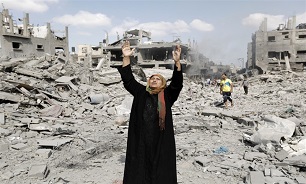UN Deeply Concerned over Ever-Worsening Humanitarian Crisis in Gaza
 In May, the Fatah-led PA decided to slash funding for
Israeli fuel to the coastal enclave, as Israeli authorities acceded to PA
demands to dramatically reduce its electricity supply to Gaza, which was
already reeling from lack of adequate access to electricity and fuel.
In May, the Fatah-led PA decided to slash funding for
Israeli fuel to the coastal enclave, as Israeli authorities acceded to PA
demands to dramatically reduce its electricity supply to Gaza, which was
already reeling from lack of adequate access to electricity and fuel.
The PA was accused of carrying out "collective punishment” on Palestinians living in the Hamas-led Gaza Strip, which had already been embroiled in a dire electricity crisis that was only worsened by increasing punitive measures by Israel and the PA.
"At the height of summer, with soaring temperatures, electricity provision has not risen above six hours per day since the beginning of the current crisis in April, and has often been under four hours,” OHCHR spokeswoman Ravina Shamdasani said during a media briefing in Switzerland, Ma'an News Agency reported.
Prior to the latest crisis, Gaza residents had received only eight hours of electricity a day under Israel’s devastating blockade, which marked its tenth year in June.
"This has a grave impact on the provision of essential health, water and sanitation services,” Shamdasani said, adding that the large-scale power cuts were a life-threatening risk for vulnerable residents of the coastal enclave. "Israel, the State of Palestine, and the authorities in Gaza are not meeting their obligations to promote and protect the rights of the residents of Gaza.”
The power cuts, which have seriously affected Gaza hospitals, come as medical sources have told Ma’an that scores of patients in the besieged Palestinian enclave, including dozens of children suffering from cystic fibrosis, were in "mortal danger” due to severe medicine shortages.
"I cannot imagine seeing a patient (with cystic fibrosis) who was not receiving medication. This is fatal,” Hiyam Marzouqa, the medical director at Caritas Baby Hospital in the occupied West Bank city of Bethlehem, told Ma’an in July. "Their lifespan is affected if they don’t take proper medication.”
While the average life expectancy of people suffering from cystic fibrosis stands between 37 and 41 years old in the United States and Europe, Marzouqa said that lack of access to holistic treatment has affected the lifespan of patients in the occupied Palestinian territory.
Caritas Baby Hospital has in the past received patients referred from the Gaza Strip, and most recently sent emergency rations of cystic fibrosis treatment to Gaza via the World Health Organization (WHO) on July 19, but Marzouqa said that no Gaza patients were being treated at the hospital as of mid-July.
"Patients in Gaza need to receive medication urgently, and they need to have properly trained medical teams to follow up with care,” Marzouqa said. "Patients have the right to health and to receive treatment without gaps, which affect the effectiveness of treatment.”
The Fatah-led PA has been accused of deliberately sending the impoverished Gaza Strip further into a humanitarian catastrophe in order to wrest control of the territory from Hamas, by slashing funding for Israeli fuel, medicine, and salaries for civil servants and former prisoners.
Numerous attempts have been made in the past to reconcile Hamas and Fatah since they came into violent conflict in 2007, shortly after Hamas’ 2006 victory in general elections held in the Gaza Strip.
However, Palestinian leadership has repeatedly failed to follow through on promises of reconciliations, as both movements have frequently blamed each other for numerous political failures.
Hamas authorities have also been accused of withholding funds collected in Gaza from the PA, as well as targeting Fatah officials in Gaza through detentions and restricting their freedom of movement.
On Aug. 3, the Hamas movement announced its readiness to do away with its administrative committee in Gaza, should the PA retract all punitive measures imposed on the besieged coastal enclave in recent months.
However, Abbas said in a speech two days later that the PA would continue to reduce financial support to the Gaza Strip as long as the Hamas movement did not stick to the PA-mandated terms of reconciliation.
